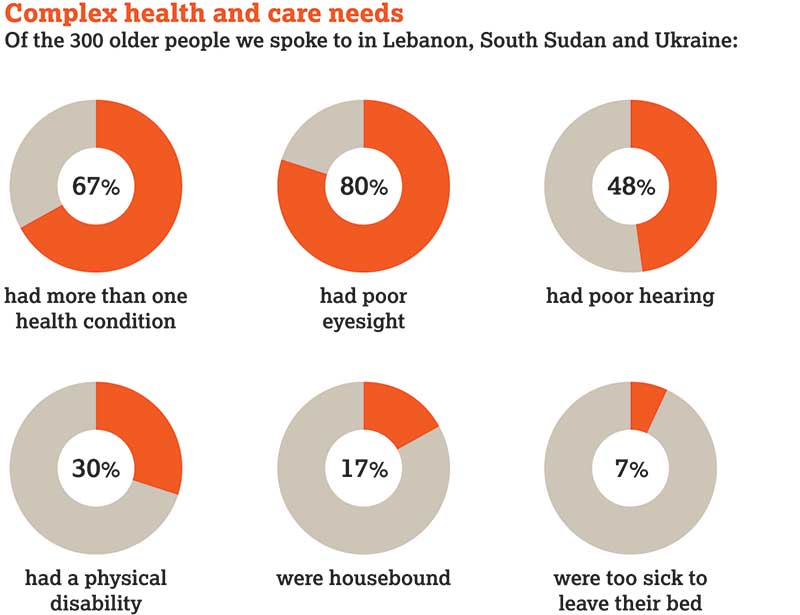Overlooked and misunderstood: older people speak about their experiences of conflict. A new HelpAge International survey of 300 older refugees fleeing from conflict in Syria, Ukraine and South Sudan has found evidence of neglect, poor health provision and feelings of isolation and fear.
The refugee crisis of the last few years has mainly focused on the lives of families torn apart by conflict, poverty and death. The focus of many of these stories, and the the heart-wrenching photographs that accompany them, has been on women and children – seen as the most vulnerable victims of crisis. Who can ever forget the image of 3-year-old Aylan Kurdi washed up on a Turkish beach, or women huddled in the freezing cold, clutching their hungry children in the heart of Europe?
Media outlets know that showing the most vulnerable victims of this crisis will strike a chord with their viewers and readers. Doing so plays an important role in raising awareness among those in more privileged situations, and hopefully inspires positive action. But what of elder victims? Are their lives and situations any less worthy of attention?
HelpAge International helps older people claim their rights, challenge discrimination and overcome poverty, so that they can lead dignified, secure, active and healthy lives. The results of their recent survey remind us that we should consider the elderly too, in any given crisis.
Almost every one of the older refugees in HelpAge’s report Older voices in humanitarian crises said they had not been consulted about their needs, more than two thirds said they did not have enough information about the humanitarian assistance available to them, almost half said health services did not provide care for their age-related conditions and close to half said they felt anxious, hopeless or depressed most or all of the time.
Older people are disproportionately affected when disaster strikes. In Hurricane Katrina, 75 per cent of those who died were over 60, despite making up only 16 per cent of the population. Similarly in the Japanese tsunami, 56 per cent of the victims were 65 and over, despite making up 23 per cent of the population.
The survey conducted at the end of last year offered older people the space to share their hopes and concerns and talk about the challenges affecting their daily lives in humanitarian crises.

Warda, an 85-year-old Syrian woman living in Lebanon, spoke for many when she said: “I know that humanitarian aid might be helping, but only for those who can go and get it. How am I supposed to get this help if I can’t even leave the room?”

Oboch, 86, living in a refugee camp in Juba, South Sudan said, “We’re always being filmed and photographed but nothing changes. We know humanitarian organisations can’t leave people to die of hunger but why is there not enough food?”
A shocking 95 per cent of older people spoken to in Lebanon, 93 per cent in South Sudan and 66 per cent in Ukraine said that no-one other than HelpAge had consulted them about their needs despite the fact that many older people are reliant on humanitarian assistance.
Anatoly, 89, (pictured at top of page) said humanitarian aid was a lifeline during the blockade in eastern Ukraine. “For nine months, we had no pension and many people simply starved. I don’t know how we would have survived without aid.”

Salwa, 60, a Syrian refugee living in Lebanon said, “We’re only able to live because of the blue card the UNHCR gave us. We used to receive US$120 per month but now we get US$40. It’s barely enough and medical help is impossible.
“My husband manages to provide us with US$4-5 a day from selling the cans he collects and my oldest daughter cleans stairs in the neighbourhood to make some money.”
An 86-year-old Syrian refugee in Lebanon said: “I’m afraid all the time. I don’t sleep well. I get headaches and tremors. I used to be able to do everything by myself. I could clean the house, take out the garbage, do some repair work and now I can’t. Now I’m older it feels as though I’m a burden and people aren’t interested in me.”
An 85–year-old woman in South Sudan put it clearly: “No-one talks to me to find out what I’m going through.”
The survey findings contribute to a growing body of evidence illustrating the failure of the humanitarian system to protect older people’s rights or meet their needs, demonstrating the limited progress the humanitarian system has made to address the neglect of older people and other vulnerable groups.

The first-ever World Humanitarian Summit this May provides a chance to lay the foundations for a reformed humanitarian system – one that puts people at the centre of disaster response, builds resilience to crises and really does ensure that we ”leave no-one behind”.
Leading humanitarian agencies have drawn up an Inclusion Charter www.inclusioncharter.org setting out the pressing commitments needed to ensure humanitarian assistance reaches the most vulnerable people.
“To address the neglect faced by older people in conflicts and disasters, their opinions must be heard and changes made in the humanitarian system,” said Frances Stevenson, head of the humanitarian team at HelpAge International.
The commitments outlined in the Charter provide governments, donors and humanitarians agencies with a set of five key actions to ensure humanitarian assistance reaches the most vulnerable people in emergencies.
To sign up to the Charter go to: www.inclusioncharter.org





































